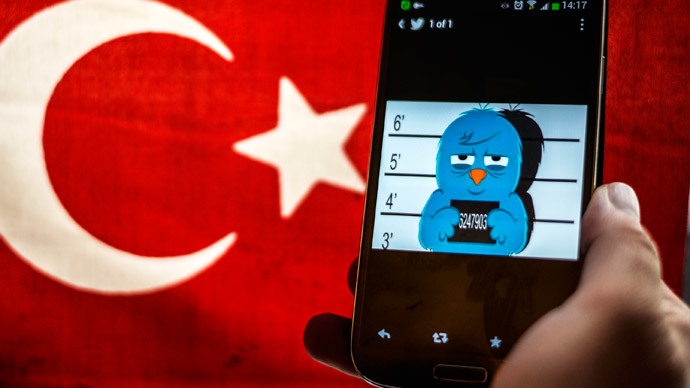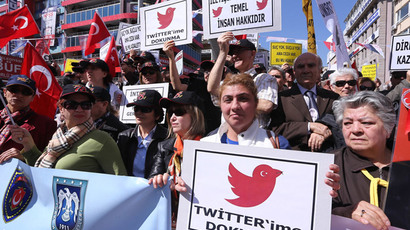Turkey’s constitutional court: Twitter ban violates free speech

The Twitter ban imposed by Turkey’s government violates freedom of expression and individual rights, said the country’s Constitutional Court after a unanimous vote on Wednesday. The ban caused mass protests and public uproar.
The Court unanimously ruled the embargo is a violation of free speech guaranteed by Article 26 of the Constitution. According to the Hurriyet Daily, an order to lift the ban has been issued.
"If they don't abide by the ruling, we will file a criminal complaint against the [country’s telecom authority] TIB by attaching the ruling of the Constitutional Court," said Metin Feyzioğlu, the president of Turkey's Bar Associations, as cited by Hurriyet.
The decision is to be delivered to TIB and Turkey's Transport, Maritime and Communication Ministry with the demand that they comply with the order.
The TIB blocked Twitter in Turkey on March 20, following Prime Minister Tayyip Erdogan’s threat to "root out" the social media network. Soon after YouTube was blocked as well while Google accused Turkish internet providers of mimicking their Domain Name System (DNS) service.
Wednesday ruling could be used as a precedent in similar cases in the future.
In February, Turkey passed a controversial law tightening control over the internet, allowing authorities to block websites without a court order within just hours.
The law followed the emergence in social networks such as Twitter, Facebook and YouTube, of multiple recordings which sought to prove Erdogan and his ministers were trying to illegally influence political, business, and media affairs.
In one recording, the Turkish PM reportedly gave instructions to his son to hide millions of euros worth of cash in his house, while in another he blamed an editor of a major newspaper for negative coverage. Erdogan dismissed the recordings calling them fake, while threatening to shut down the social networks in Turkey.
Last week the Ankara administrative court issued a stay of execution on Prime Minister’s decision to block Twitter, after the Union of Turkish Bar Associations (TBB), the Ankara Bar Associations, and Nationalist Movement Party (MHP) Deputy Parliamentary Group Chair, Oktay Vural, applied to the administrative court to challenge the ban.
"If there is anyone who believes there is rule of law and human rights in this country, TIB must execute the court verdict and lift the ban on Twitter," the academic, Kerem Altiparmak, said on his Twitter account.
Twitter in turn filed lawsuits in several Turkish courts to challenge the access ban on Twitter, joining Turkish journalists and legal experts, Turkish citizens and the international community in formally asking for the ban to be lifted.
Erdogan’s threats and the government ban were accompanied by mass protests against internet censorship. There were violent clashes as the police forces used tear gas and water cannon against the protesters. The scandal occurred ahead of nationwide elections, which resulted in the triumph of Prime Minister’s ruling AKP party this week.














